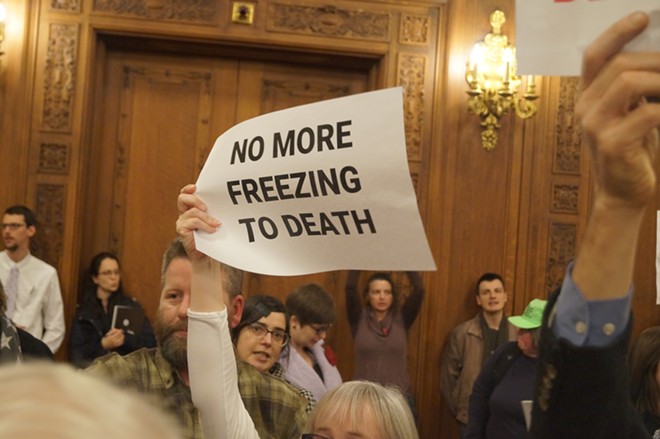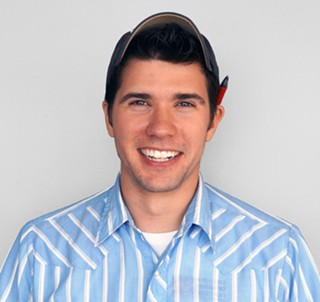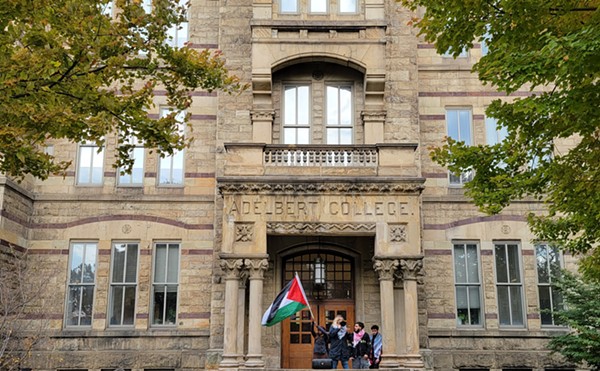Lack of Public Comment in Cleveland an Indictment of Council Leadership
By Sam Allard on Wed, Apr 21, 2021 at 2:57 pm
[
{
"name": "Ad - NativeInline - Injected",
"component": "38482495",
"insertPoint": "3",
"requiredCountToDisplay": "5"
},{
"name": "Real 1 Player (r2) - Inline",
"component": "38482494",
"insertPoint": "2/3",
"requiredCountToDisplay": "9"
}
]
Cleveland City Councilman Basheer Jones was advocating for public comment at council meetings behind the scenes long before the citywide activist coalition Clevelanders for Public Comment began its public pressure campaign this year.
After the Denison UCC controversy in early 2020, when supporters of the church attended a City Council meeting en masse and were forced to disrupt the proceedings to speak in support of those experiencing homelessness, Jones began lobbying his colleagues to get a regular comment period at council's Monday meetings. He told Cleveland Magazine that he managed to get support from six of his colleagues, but didn't have the support of Council President Kevin Kelley.
Now, thanks to the advocacy of Clevelanders for Public Comment and the heightened responsiveness of legislators occasioned by the election year, council appears to have majority support for the proposed legislation, crafted by resident Jessica Trivisonno.
Speaking at a City Club forum Wednesday, Jones was candid about the opposition he has faced. He said the legislation Trivisonno wrote, which prescribes a 30-minute public speaking period at meetings, was "fair and balanced." Those who have not lent support to it, he said, simply do not want to hear the voice of the people.
"Thirty minutes is not a long time," Jones said. "When you speak to elected officials who have a problem with this, the response has been, 'We don't want things to get out of hand.' But if it's a problem to hear the voice of the people, that's a problem and of itself."
Without mentioning Kevin Kelley by name, Jones repeatedly said that those holding up the legislation in council have been doing so for quite some time, and are by and large the same leaders who have backed corporate interests over the concerns of the population.
"You have to wonder," Jones said, "are they afraid of hearing what people have to say, or are they afraid of going against the establishment?"
Jones said that Kelley's recent response to Clevelanders for Public Comment — he has forwarded the idea to council's policy research cluster and will consider a rule change — was itself a form of opposition. Both Jones and Trivisonno have stated repeatedly that no additional research is necessary. The ordinance was based on the best practices of a number of peer cities and included historical research. Kelley's maneuver was merely a delaying tactic, an effort to control and subdue the outcome.
"Clevelanders are smart," Jones said. "We know the issue. We know why it's not passing. And we may not want to put certain people on blast, but there are a group of people who don't want to hear the voice of the people ... who are standing in the way of progress."
Like Jones, Ward 17 Councilman Charles Slife appeared on the City Club forum and agreed that an ordinance would be a more meaningful step than a council rule change, which is the avenue Kelley prefers. Slife said a policy change could be changed by subsequent council presidents.
"There's real value to [public comment] being codified law in the city of Cleveland," Slife said. "It carves the idea into stone. Moving forward, it will be understood as a fundamental right of the people. If it were a policy change, you are arguably subjecting it to the whims of an individual."
The forum, moderated by ideastream's Nick Castele, recapitulated the arguments for a public comment period. Among them: it increases citizen engagement; it allows residents to address the Mayor and his cabinet, in addition to city council, directly; it illuminates the diversity of opinion on a broad range of civic affairs.
Those values were demonstrated during the City Club's traditional Q&A, which Wednesday was recast as a public comment period. It featured a number of Cleveland residents, including mayoral candidate Ross Dibello and City Council candidate Rebecca Maurer, speaking on an array of pivotal city topics: the division of public works and the city's recycling program; the availability of nationwide private grants that Cleveland could take advantage of; democratic processes at City Hall; potential uses of the $541 million in American Rescue Plan dollars; the experiences of Cleveland's AAPI community; and city council's financial support for developers who don't hire union workers to clean and service their buildings.
In 30 minutes, the demonstration corroborated the power and value (for both residents and legislators) of regular feedback delivered in a public forum. As Jones, Slife and Trivisonno said, this ordinance should not be controversial.
Public comment is something virtually every other peer city makes available to residents as a routine good-government practice. Slife, who called the legislation "achievable and specific," admitted that in every other city he's lived in, a public comment period was offered at City Hall. In fact, he assumed it was mandatory.
The fact that residents remain sidelined at council meetings, and that Clevelanders for Public Comment has had to exert so much effort to get the city legislature to meet this extremely low bar, is an embarrassment for Cleveland. It's an indictment of council leadership and a reflection of its ardently anti-democratic posture in recent years. On the other hand, the broad coalition of activists and organizers who have exerted that effort, in the face of the local hostility to democratic reforms, should be commended.
***
Sign up for Scene's weekly newsletters to get the latest on Cleveland news, things to do and places to eat delivered right to your inbox.
SCENE Supporters make it possible to tell the Cleveland stories you won’t find elsewhere.
Become a supporter today.
About The Author
Sam Allard
Sam Allard is the Senior Writer at Scene, in which capacity he covers politics and power and writes about movies when time permits. He's a graduate of the Medill School of Journalism at Northwestern University and the NEOMFA at Cleveland State. Prior to joining Scene, he was encamped in Sarajevo, Bosnia, on an...
Scroll to read more Cleveland News articles
Newsletters
Join Cleveland Scene Newsletters
Subscribe now to get the latest news delivered right to your inbox.















